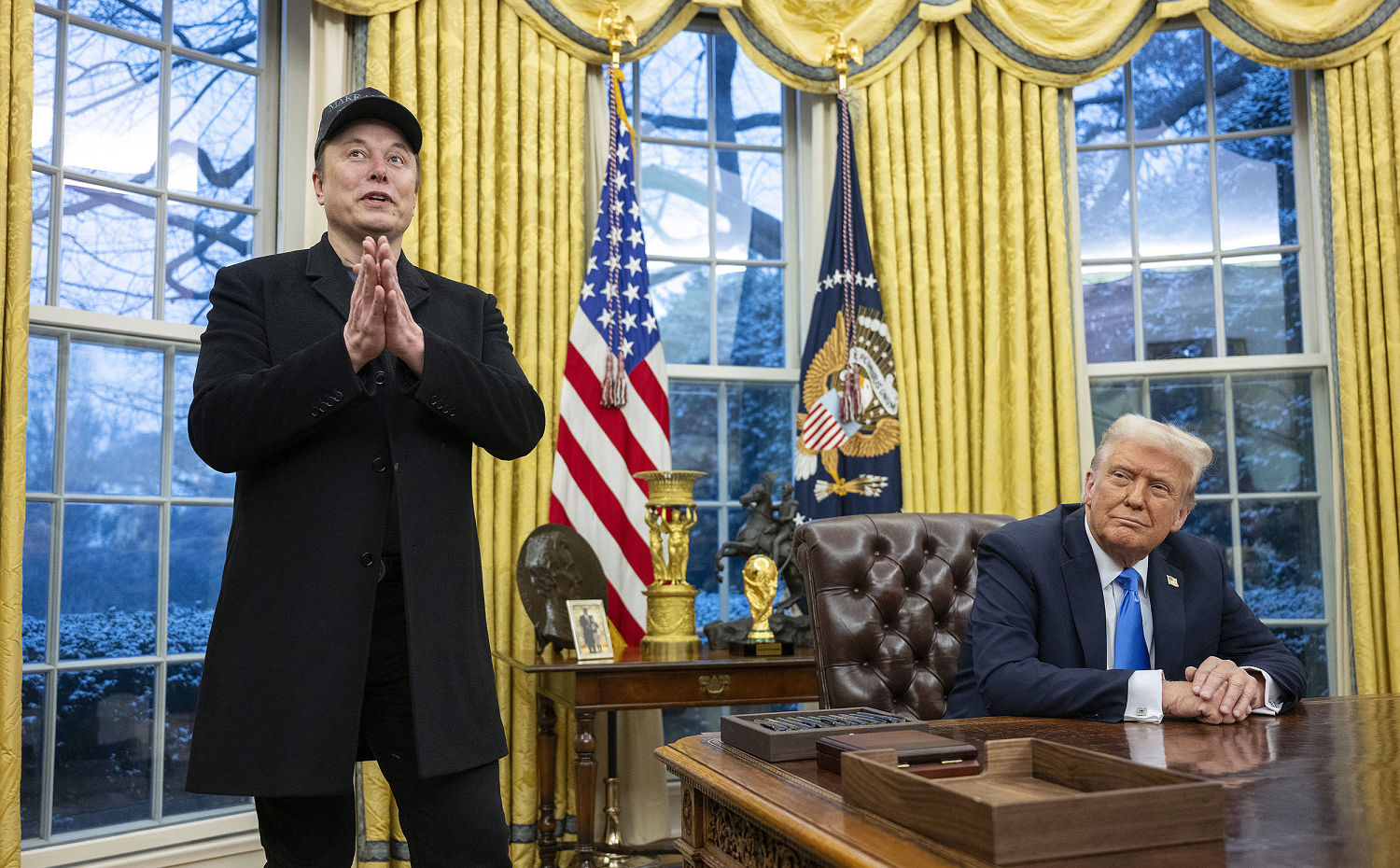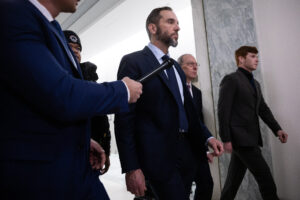The Dictatorship
Social Security is the latest front in Trump and Musk’s attack on trust in government

Standing next to President Donald Trump in the Oval OfficeElon Musk conjured an image of a Social Security system riddled with fraud that was as vivid as it was make-believe. For example, Musk said that large numbers of 150-year-olds are receiving Social Security benefits. But, as Wired notedwhen recipients’ birth dates are default or incomplete, the programming language that Social Security’s benefits system was written in defaults to 1875. What Musk came across was a programming quirk, not fraud.
But since Musk is now one of the key nodes of the right’s ever-mightier misinformation machine, his falsehood was quickly spread to untold millions as more (fake) evidence that the federal government is a mess. And it gets worse: The Social Security Administration’s top official, Michelle King, a civil servant with decades of experience, resigned in protest after a confrontation in which she refused to give the so-called Department of Government Efficiency access to the incredibly sensitive information about every American stored in Social Security’s databases.
Trump has always both exploited and encouraged distrust in government.
It’s not clear whether DOGE now has that access, or what they would do with it. And if that makes you deeply uneasy, know that that anxiety is perfectly fine with the Trump administration.
In the 1960s, as much as three-quarters of the public told pollsters they trusted the government to do what is right either most of the time or always; today that number sits in the low 20s. The reasons for the decline are complex, but Trump has always both exploited and encouraged distrust in government; the fact that it is so widespread is a key reason he is president right now.
Yet if electing Trump is a symptom of distrust toward the government, the early days of his administration indicate he will give Americans even more reason to believe that the government can’t solve problems, doesn’t keep its promises, and never deserves the benefit of the doubt.
Among the victims of this alternately haphazard and malevolent approach is a group that voted overwhelmingly for Trump. Farmers who signed contracts with the government to begin conservation and renewable energy projects on their land, that obligated the government to reimburse them for the cost of those projects, have seen the funds frozen. That leaves them holding the bag for loans they took out and money they invested on the assumption that the government would keep its end of the agreement. One farmer told The New York Times he would “never do anything with any government agency ever again.”
This story is playing out with various government programs across the country. Small nonprofits that receive federal funds to provide services like Head Start or rides for the elderly to dialysis treatment have had to lay off workers or shut down entirely because of the funding freeze. The Solar For All program had signed contracts worth $7 billion with states, localities and nonprofits to set up community solar projects; the Trump administration froze the funds and left many projects in limbo. Last week, the administration essentially shut down the Consumer Financial Protection Bureau, leaving consumers more vulnerable to financial scams. And the White House plans to lay off thousands of IRS workers, which will likely reverse the progress the agency had recently made in improving customer service.
The next Democratic president and Congress will have an enormous challenge.
These are just a few of the actions the administration has taken, but the result will be the same: a government that gives people poorer service, can’t be trusted to keep its word, and isn’t there when we need it. In the future, how many people will want to enter into contracts with the government like the ones those farmers did? How many talented and idealistic young people will choose to go into public service after watching thousands of civil servants summarily fired?
This is a tragic irony of the destruction currently in progress: A genuine, good-faith effort to improve government efficiency could save money, help Americans by improving the delivery of services and boost people’s faith in government. It would be an extremely worthwhile undertaking; there is plenty of room for improvement in how the federal government operates. This administration, however, is not operating in good faith, and it seems determined to give people more reasons to believe that government can’t do anything right.
Many conservatives dislike government for ideological reasons; whether it does its job well or poorly, they’ll still say they don’t trust it. But there are millions of Americans who judge government based on what they’ve heard and what they’ve experienced. Long after Trump and Musk are done slashing and burning their way through Washington, their suspicions will remain.
That means the next Democratic president and Congress will have an enormous challenge when they try to make the case that government can be an ally rather than an impediment. Not only will they face the practical task of rebuilding what Trump and Musk have destroyed, they’ll have to rebuild trust as well — and that could be even harder.
The Dictatorship
Man arrested for assaulting congressman at Sundance Film Festival

PARK CITY, Utah (AP) — A man was arrested Friday night at a party during the Sundance Film Festival in Park City, Utah, for allegedly assaulting a Florida congressman.
Democratic U.S. Rep. Maxwell Frost wrote on X on Saturday that he was punched in the face by a man who told Frost that President Donald Trump was going to deport him. The altercation occurred at a private party hosted by talent agency CAA at the High West Distillery, a popular venue for festival-adjacent events.
“He was heard screaming racist remarks as he drunkenly ran off,” Frost wrote. “The individual was arrested and I am okay.”
Frost, the first Gen Z member of Congress, thanked the venue security and the Park City Police Department for their help. A Park City Police Department representative said officers arrived on the scene just after midnight.
Christian Joel Young, 28, was arrested on charges of aggravated burglary, assaulting an elected official and assault and transported to Summit County Jail, according to court records.
Young appeared to have crashed the party by jumping a fence and had a Sundance Film Festival pass that was not issued in his name, according to the police affidavit.
It was unclear if Young had an attorney who could speak on his behalf. The Associated Press left messages with the Summit County Sheriff’s office and Utah courts in an attempt to request comment from Young or a lawyer.
Stay up to date with the news and the best of AP by following our WhatsApp channel.
The Sundance Film Festival representatives released a statement saying that they “strongly condemn” the incident, noting that while it occurred at a non-affiliated event that the behavior is “against our values of upholding a welcoming and inspiring environment for all our attendees.”
“The safety and security of our festival attendees is always our chief concern, and our thoughts are with Congressman Frost and his continued well-being,” the statement read. “We encourage anyone with additional information on this matter to contact the Park City Police Department.”
County Judge Richard Mrazik ordered Young held without bail, on the grounds that he would constitute, “a substantial danger to any other individual or to the community, or is likely to flee the jurisdiction of the court if released on bail.” Young has a prior misdemeanor conviction, according to court records.
Utah Gov. Spencer Cox, a Republican, denounced the alleged attack and said he won’t let tensions over immigration enforcement in places like Minneapolis spill into Utah.
“Political or racially charged violence of any kind is unacceptable in Utah,” Cox said in a statement. “I’m grateful to local law enforcement for swiftly apprehending the assailant and pursuing justice for Rep. Maxwell Frost.”
Federal immigration enforcement efforts are “welcome and necessary,” he added.
House Minority Leader Hakeem Jeffries wrote on X that he was horrified by what had happened and that “the perpetrator must be aggressively prosecuted.”
“Hate and political violence has no place in our country,” Jeffries continued.
Messages seeking comment were left for representatives for CAA.
___
Associated Press writer Hannah Schoenbaum contributed.
___
For more coverage of the 2026 Sundance Film Festival, visit: https://apnews.com/hub/sundance-film-festival
The Dictatorship
Amanda Gorman honors Alex Pretti in new poem

Amanda Gorman shared a powerful poem on Instagram that she wrote in honor of Alex Pretti, the 37-year-old ICU nurse and U.S. citizen killed by a federal immigration officers in Minneapolis, Minnesota, on Saturday.
The poem, “For Alex Jeffrey Pretti,” characterizes Pretti’s killing as a “betrayal” and an “execution.”
Gorman, earlier this month, also paid tribute to Renee Nicole Good, another U.S. citizen killed by a federal immigration officer in Minneapolis on Jan. 7. In a caption accompanying another poem shared on Instagram, Gorman said she was “horrified by the ongoing violence that ICE wages upon our community. Across our country, we are witnessing discrimination and brutality on an unconscionable scale.”
Her poem says, in part: “You could believe departed to be the dawn/ When the blank night has so long stood./ But our bright-fled angels will never be fully gone,/ When they forever are so fiercely Good.”
The 27-year-old writer and activist famously recited her poem, “Blue Light News We Climb,” at Joe Biden’s presidential inauguration in 2021. Gorman has also written poems in the wake of other tragedies in the country, including “Hymn for the Hurting,” about the Robb Elementary mass shooting in Uvalde, Texas in 2022. She also performed a poem she wrote about reproductive rights and the Roe V. Wade Supreme Court case in a NowThis video in 2019.
Erum Salam is a breaking news reporter and producer for MS NOW. She previously was a breaking news reporter for The Guardian.
The Dictatorship
Ted Cruz bashes Vance and Trump in secret recordings
Sen. Ted Cruz, R-Texas, in recordings obtained by Axiosseems to have a bone to pick with Vice President JD Vance and sometimes, President Donald Trump.
In his remarks, which lasted about 10 minutes and were reportedly made in a private meeting with donors sometime last year, Cruz portrays himself as an economically-minded, pro-interventionist who has the president’s ear.
The Texas senator is also heard criticizing former Fox News personality, Tucker Carlson, and his relationship with the vice president. “Tucker created JD. JD is Tucker’s protégé, and they are one and the same,” Cruz told donors.
Cruz, who has clashed with Carlson in the past over foreign intervention policies, bashed the administration’s appointment of Israel critic Daniel Davis to a top national intelligence position. A vocal supporter of Israel himself, Cruz called Davis “a guy who viciously hates Israel,” and credited himself with removing Davis from the job.
The Republican senator also blamed Vance and Carlson for ousting former national security adviser Mike Waltz over similar anti-interventionist sentiments related to Iran.
“[Waltz] supported being vigorous against Iran and bombing Iran — and Tucker and JD took Mike out,” Cruz said.

Cruz also said he has been trying to get the White House to accept a trade agreement with India, but claimed White House economic adviser Peter Navarro, Vance and “sometimes” Trump, are resistant.
Domestically, Cruz cautioned donors about Trump’s tariffs, which he said could result in severe economic and political consequences. Cruz is reportedly heard telling donors that he told the president “if we get to November of [2026] and people’s 401(k)s are down 30% and prices are up 10–20% at the supermarket, we’re going to go into Election Day, face a bloodbath.”
Cruz said a conversation he had with Trump about tariffs “did not go well,” and that Trump was “yelling” and “cursing.” Cruz said Trump told him: “F*** you, Ted.”
“Trump was in a bad mood,” Cruz said. “I’ve been in conversations where he was very happy. This was not one of them.”
In a statement about the recordings, a spokesperson for Cruz said he is “the president’s greatest ally in the Senate and battles every day in the trenches to advance his agenda. Those battles include fights over staffers who try to enter the administration despite disagreeing with the president and seeking to undermine his foreign policy” and that “these attempts at sowing division are pathetic and getting boring.”
In an email responding to MS NOW’s request for comment on Cruz’s reported statements, the White House did not address Cruz’s statements.
Erum Salam is a breaking news reporter and producer for MS NOW. She previously was a breaking news reporter for The Guardian.
-

 The Dictatorship11 months ago
The Dictatorship11 months agoLuigi Mangione acknowledges public support in first official statement since arrest
-

 Politics11 months ago
Politics11 months agoFormer ‘Squad’ members launching ‘Bowman and Bush’ YouTube show
-

 The Dictatorship5 months ago
The Dictatorship5 months agoMike Johnson sums up the GOP’s arrogant position on military occupation with two words
-

 Politics11 months ago
Politics11 months agoBlue Light News’s Editorial Director Ryan Hutchins speaks at Blue Light News’s 2025 Governors Summit
-

 The Dictatorship11 months ago
The Dictatorship11 months agoPete Hegseth’s tenure at the Pentagon goes from bad to worse
-

 Politics11 months ago
Politics11 months agoFormer Kentucky AG Daniel Cameron launches Senate bid
-
Uncategorized1 year ago
Bob Good to step down as Freedom Caucus chair this week
-

 Politics9 months ago
Politics9 months agoDemocrat challenging Joni Ernst: I want to ‘tear down’ party, ‘build it back up’





